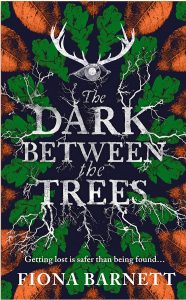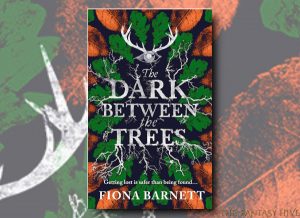THE DARK BETWEEN THE TREES by Fiona Barnett (BOOK REVIEW)
‘Alice was a historian, which meant that part of her wanted that connection to people over the centuries, people who would never and could never meet and yet still had something In common with each other.’
The Dark Between The Trees
Fiona Barnett
Author Fiona Barnett on the book:
“This story is a mashup of so many of my favourite things: campfire stories, ordinary foot-soldiers in one of the most exciting parts of British history, the things that come slithering out of the darkest part of the woods, and competent women yelling at each other. I’m thrilled that the folks at Rebellion have come with me into the mists of this particular deep forest, and I can’t wait to see The Dark Between the Trees out in the world!”
Bio:
Fiona Barnett lives in Edinburgh, but grew up by the New Forest with stories of Roundheads and Cavaliers, and ancient secrets in the heart of the woods. She has podcasted on the British Civil Wars, and her short fiction has appeared in Haunted Voices: An Anthology of Scottish Gothic Storytelling.
 Fiona Barnett’s novel The Dark Between the Trees plays with the readers emotions, expectations, and morbid curiosity. Set in the deep dark woods that litter British folklore and history, the novel is haunted by our own fears and experiences of the forest. A twig snaps behind you and you whip your head around to see who is there, but there is no one. You swear you have already seen this weirdly-bent tree half an hour ago, but nobody else can remember. You can smell the earth, hear the wind, and see that there is nothing to be afraid of except your own shadow, but what if you are wrong?
Fiona Barnett’s novel The Dark Between the Trees plays with the readers emotions, expectations, and morbid curiosity. Set in the deep dark woods that litter British folklore and history, the novel is haunted by our own fears and experiences of the forest. A twig snaps behind you and you whip your head around to see who is there, but there is no one. You swear you have already seen this weirdly-bent tree half an hour ago, but nobody else can remember. You can smell the earth, hear the wind, and see that there is nothing to be afraid of except your own shadow, but what if you are wrong?
‘The wind whipped up in the trees around them, periodically, and Moresby Forest whispered its secrets in a way that, in Nuria’s half-awake state, sounded almost like people. ‘
The novel is bloated with mythological folklore, similar to tales told in the British countryside and dripping with appropriate historical context. From a local monster to children be accused of witchcraft, and weird families making deals with the devil, Moresby Forest has it all. There is something wrong with the Forest, and many believe it is a supernatural presence, ‘it was demonic, or it was old enough that it didn’t have to behave by civilised rules’. The locals refuse to enter, telling the same stories that their ancestors told, insisting that once you enter the woods, you will never be seen again.
‘we’ve announced ourselves. They know we’re here now.’
Nuria has been working on her PhD, she is stressed and exhausted, with only 6 weeks until her thesis is due. Her secondary supervisor, Dr Alice Christopher, has asked her on a trip to Moresby Forest, along with three others. To search for evidence of a small group of soldiers who vanished in the Forest in 1647. Alice’s entire life has been dedicated to finding out what happened to Captain Davies and his party, the only surviving account of the group entering the woods was written by a local priest, who had written down the tale that The Deserters from Captain Davies Party had told. Nuria has also studied to woods, and entertains her fellow explorers with the historically accurate detail as well as the ghost stories, as they journey into the woods on their expedition. No one realised how lost they would get, or how much better that would be than the alternative.
‘The ghost story […] takes place many years ago, in the fourteenth century, when England was much younger but its forests were already old. And this one in particular was old, and no one lived in it’
As the reader follows Nuria and the expedition there is a distinctive air of uncertainty, Barnetts language is purposefully disorientating and disjointed, making it hard to map out the narrative in your own imagination. This is clearly intentional; how could one write a novel about being lost in the woods without disorientating the reader? The divided narrative and timeline brings history to life in a way that I weirdly did not expect, but was also not surprised by. The Uncanniness of this novel gives you anxiety and curiosity, like you are trying to find out the Forest’s secret, even thought you knew it all along.
“did you see it?”
“see what?”
“The other wood.”
Sigmond Freud stated that the feeling of the uncanny is related to ‘the class of frightening which leads back to what is known of old and long familiar,’ or like learning of a secret that should have remained hidden. No words describe the feelings that Barnett engenders with her Moresby Forest, that sense of familiarity that comes with large old forests and British folklore filling in strange gaps in our history, alongside the discovery of something you wish you never knew. These uncertainties and uncanniness carry you through the novel, following our characters to a climactic and traumatic conclusion.
‘The monsters people had feared in the seventeenth century, in the fourteenth, were real, even if they were nothing like the stories made them out to be.’
There are small, but largely un-notable, echoes and allusions from other works; such as Stranger Things (The Demogorgon), The Blair Witch Project (Literally because they are in the woods), Cabin in the Woods (the presence meets the past) and the Video Game Alan Wake. Of course, anyone reading this novel will be forced to remember folktales and stories they have heard over the years about uncanny and supernatural happenings that happen in the woods, which will impact every reader differently. I imagine everyone will feel the same strange familiarity with this novel, like they KNOW this story and have heard it before, but you cannot remember where, or when.
“you think there’s something following us?”
“Can you not hear it behind us? It’s been here since the candle blew out.”
This novel is uncomfortable, phantasmagorical, and should have it’s binding gripped with anxiety whilst readers learn the truth of what happened to the Davies party, and what is going to happen to anyone who tries to follow them into Moresby Forest. I hope you enjoy this novel as much as I did.
The Dark Between the Trees is out from Rebellion Publishing in October.
You can pre-order your copy from:

